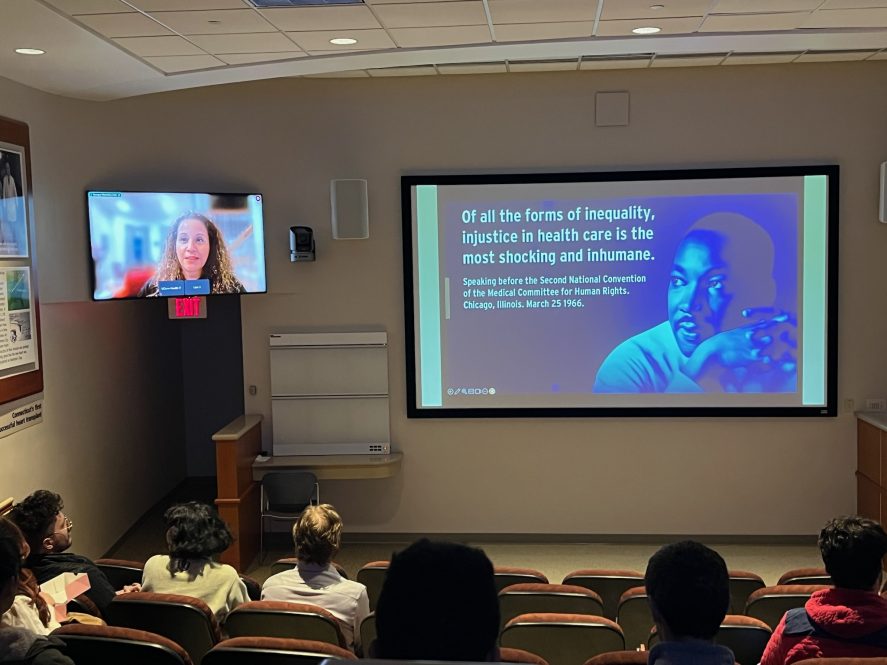On Jan. 30 the legacy of Martin Luther King Jr. was celebrated at the first Service and Advocacy Summit at UConn Health.
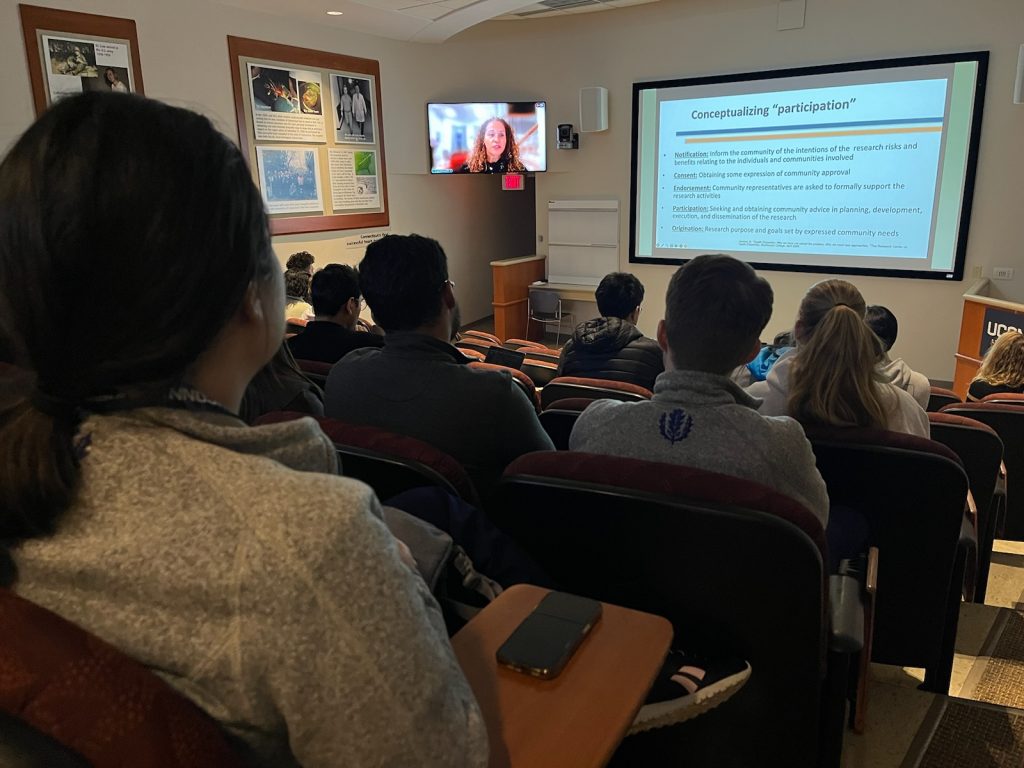 The summit’s keynote speaker was Linda Sprague Martinez, Ph.D., director of the Health Disparities Institute.
The summit’s keynote speaker was Linda Sprague Martinez, Ph.D., director of the Health Disparities Institute.
She kicked off her address with the famous words of MLK: “Of all the forms of inequality, injustice in health is the most shocking and inhuman.”
“We see inequities in health care and in health outcomes across a spectrum of chronic conditions,” she stressed in her address to faculty, students, and staff about the benefits of “Community Based Participatory Research Advancing Health Equity.”
“Participatory research is a collaborative approach to research,” she says. “Advancing health equity requires conducting research with the community. Working in partnership facilitates an environment in which we are co-learning.”
She adds, “People in the community know what they need to be healthy,” and recommends research priorities originate in the community, building trust relationships with the community members, and then co-designing research protocols based on community identified priorities.
“If we are not translating knowledge generated in community settings in partnership with community members, we are not going to bring about meaningful change,” reports Sprague Martinez.
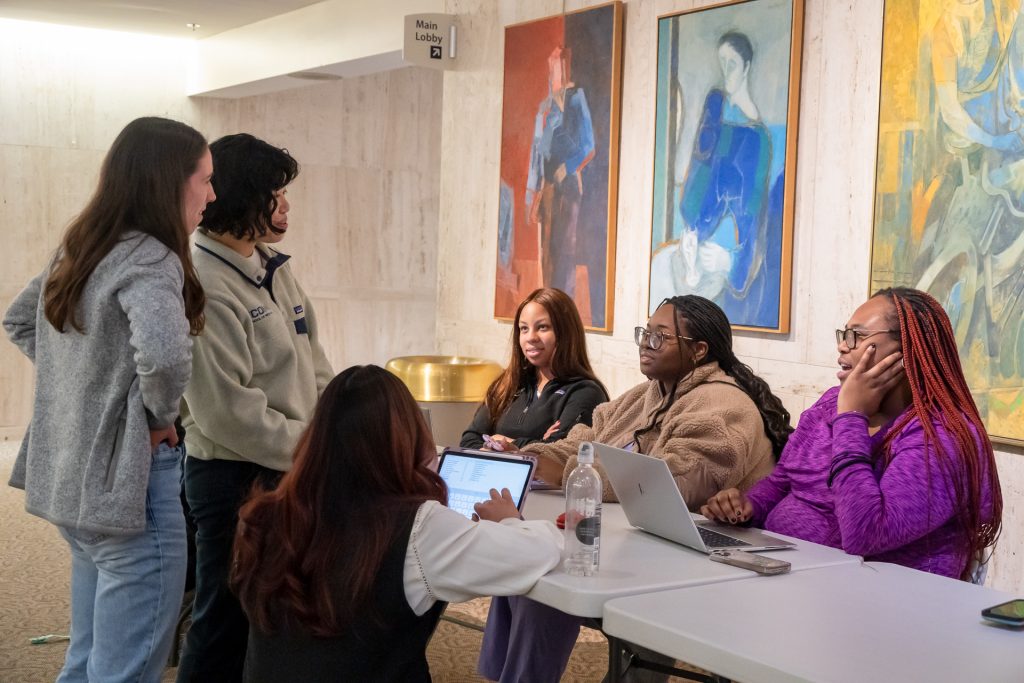
As a strong example of participatory research, Sprague Martinez shared how her UConn Health Disparities Institute is collaborating with the state of Connecticut’s Commission on Racial Equity for Public Health to launch a community-based research project recruiting citizens from across the state as community research advisors and faculty to advance health equity.
Sprague Martinez serves UConn School of Medicine as professor in the Department of Medicine and Department of Public Health Sciences, and faculty affiliate at UConn School of Social Work.
At the event student organization’s such as UConn School of Pharmacy Diversity Committee, Pathway Scholars Foundation, Student National Medical Assoc (SNMA), Latin Medical Student Assoc (LMSA), Medial Students for Choice (MSFC), and the Student Diversity Equity & Inclusion Committee (SDEIC) also showcased their community outreach efforts.
Class of 2027 medical student Uma Mehta was one of the student organizers of MLK Week, along with Cailyn Regan and Jenn Casparino, and attended the Summit’s student showcase.
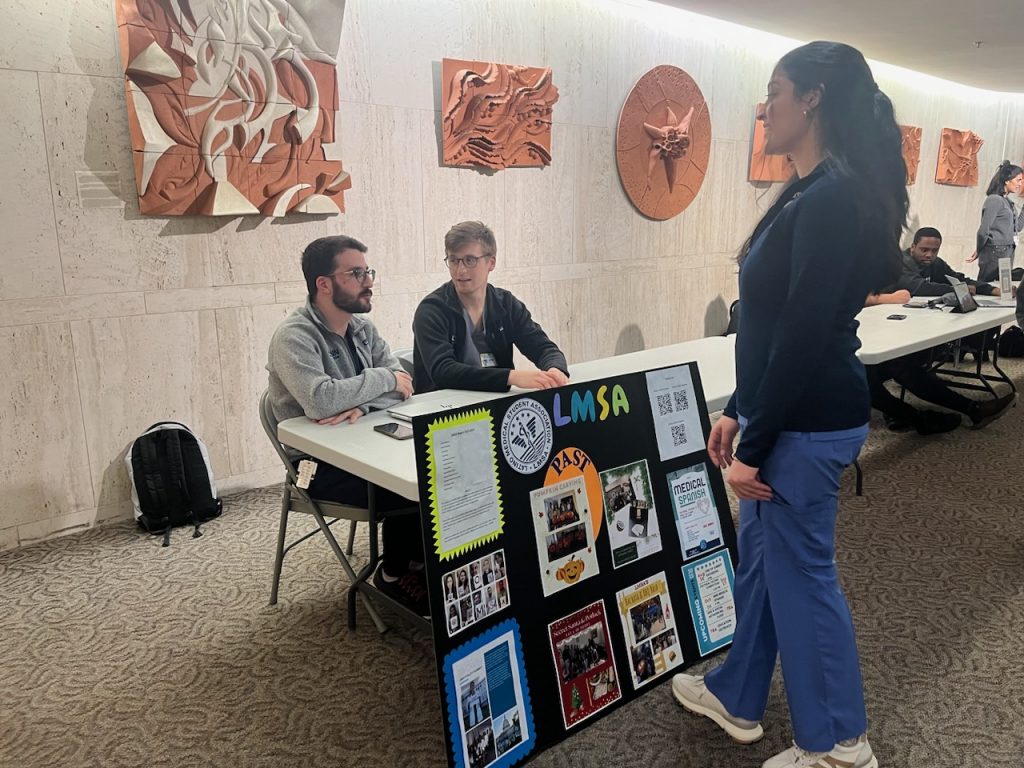
“When I think of MLK I envision hope, symbols of resistance, and expression of ideals,” shared Mehta. “For our patients things are at times uncertain, especially after a diagnosis. But as providers we can help give them a sense of hope, autonomy, and power over their diagnosis. This can be really helpful, healing, and powerful.”
MLK week festivities also celebrated the health care disparities research of medical and dental students in a research poster showcase outside the Academic Rotunda lobby.
All medical students are required as part the curriculum to complete a Public Health Certificate in Social Determinants of Health and Disparities. In fact, UConn medical school was the first in the nation to require students to complete a certificate curriculum in social determinants of health.
Final projects for the second-year students were displayed in the Rotunda Lobby for over a week with live poster session presentations.
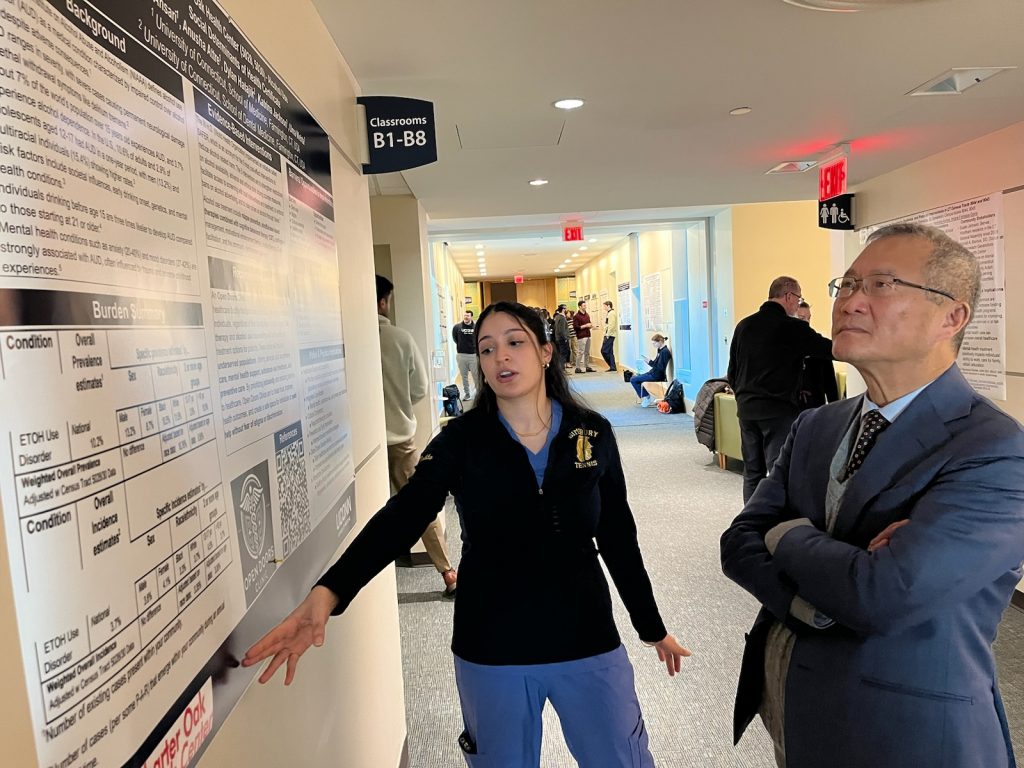
For example, Joseph Chopra of Bedford, New Hampshire is a second-year medical student. He presented his research team’s project focused on solving the issues of the underserved COPD population in Connecticut’s census. His research team is proposing a community-driven initiative and inexpensive intervention tool to improve indoor air quality thru DIY air filters.
“Our COPD populations are underserved. COPD is associated with more sickness and poorer outcomes overall. COPD leads to worse outcomes for older people too,” said Chopra. “We wanted to find an intervention that helped.”
Chopra has been inspired by MLK’s legacy and also the community outreach efforts he has witnessed while in medical school at UConn.
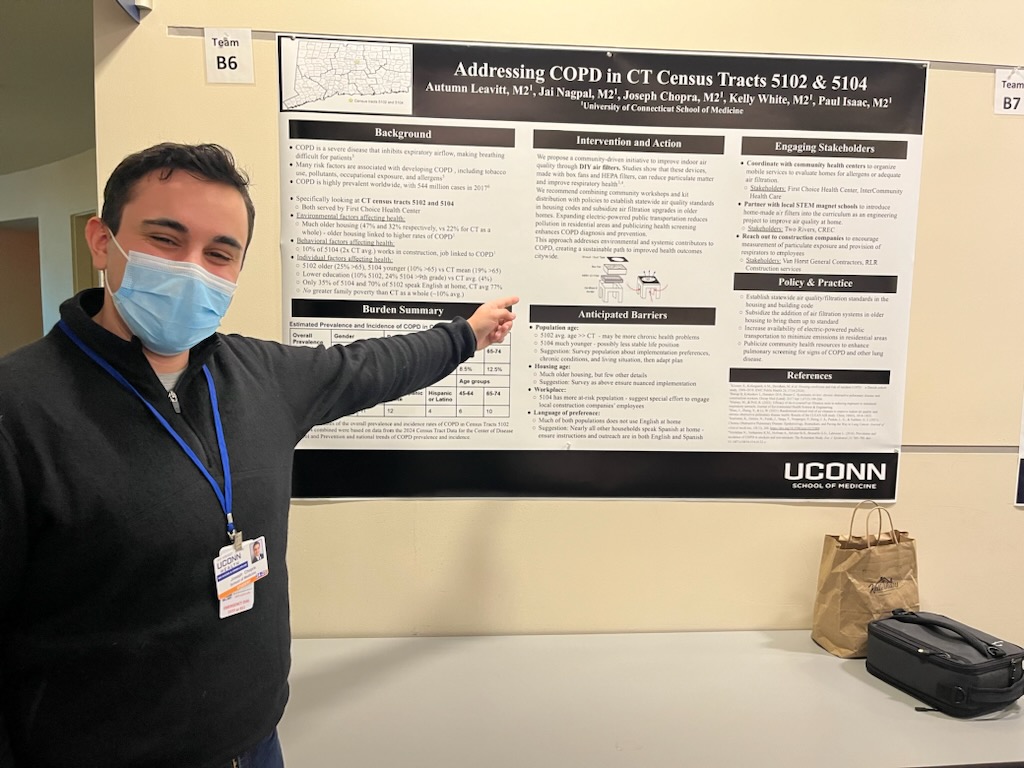
“I have found a lot of inspiration from the people inside the community. Community outreach is very important and its wonderful to have the opportunity to learn from them about health disparities,” he says.
Second-year medical students Samantha Mae Mallari of Milford and Ethan Knapp of Ridgefield were presenting their research project for their student team.
It was about “Evidence-Based Strategies to Address Coronary Heart Disease in Norwalk, CT” and how a soda tax, produce prescription program, and Farmer’s Market could potentially lead to a healthier city.
“Coronary artery disease and diabetes are big issues and we need to address their root causes,” shared Knapp. “We need to focus on diet.”
They have both really enjoyed UConn School of Medicine’s teachings about health disparities and the certificate program.
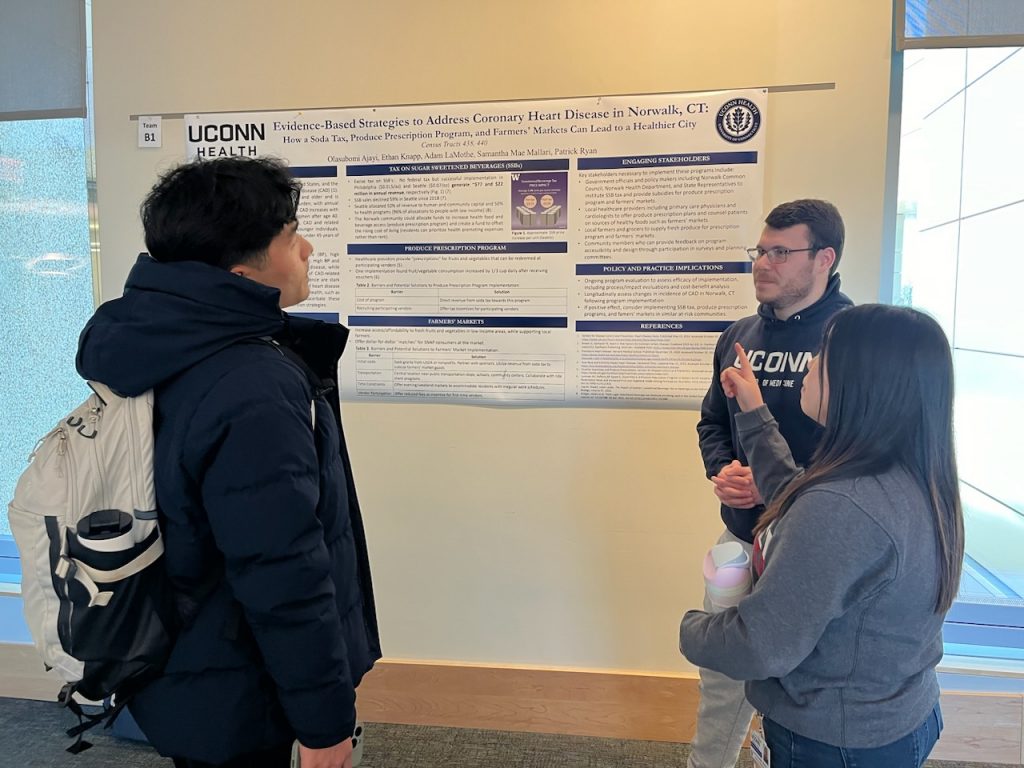
“It’s a good way to teach us all the social factors that go into medicine, and for a well-rounded curriculum,” says Knapp. “A lot of our medical school graduates stay in Connecticut to serve underserved populations, so it’s good for us to learn how to address all their social determinants of health.”
Mallari concludes, “We have MLK Day, but we should be thinking about health disparities always, especially in the medical field.”
